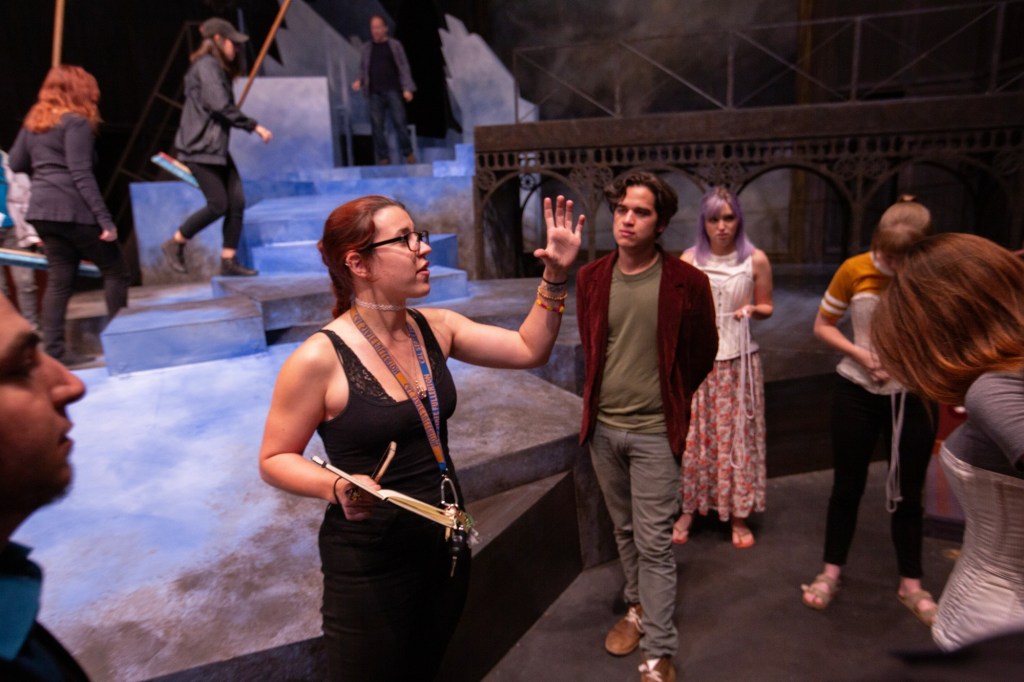Successful teachers understand that mastery of a given discipline is only part of the equation; they must also impart what they know in ways that motivate and inspire their students to learn as empowered, independent critical-thinkers.
To that end, pedagogy, the study and application of how knowledge and skills are furnished in an educational context, is a central focus of Cal State Fullerton’s new Single-Subject Credential in Theatre, a one-year program that prepares bachelor of arts graduates in any major to teach theater in K-12 schools. The program’s first cohort began this fall.
“I’m showing future theater teachers how to communicate craft skills and knowledge in a way that helps them pass on essential performance techniques to their own students, rather than directing them to perform through emotional manipulation, which has historically happened throughout the industry,” said Amanda Rose Villarreal, CSUF associate professor of theater and subject area coordinator of theater education, who has written theater-curriculum guides for multiple school districts.
While the Single-Subject Credential in Theatre accepts bachelor’s graduates in any major, those with a B.A. in theater are especially well-situated to teach in this discipline, since they’ve received training and instruction in a broad range of related subjects such as casting, acting, directing, choreography, costumes and lighting. To be accepted into the program, however, non-theater B.A. grads must pass the CSET Exam for Theatre. One of the California Subject Examinations for Teachers, it tests for knowledge in theater history, acting techniques and skills and “devising” (the process of developing new works through creative exploration), among many other elements.
New program cohorts will begin every fall. Along with a variety of theater-related classes, students receive a world of hands-on teaching experience while being supervised by teacher-mentors. And this month only, the program is crowdfunding to send the fall cohort to a national professional conference for theater educators in the spring (fullerton.scalefunder.com/cfund/project/47258).
Discussing the importance of pedagogy, Villareal noted that, “A theater teacher is a one-person production team. We look beyond lesson planning, instruction and classroom management and ask, How do you build out a program? How do you create a sequence of learning experiences that makes theater accessible for your whole student population? Historically, when there wasn’t training in theater pedagogy, very well-intentioned teachers who didn’t understand how to provide stepping stones for students to become good actors would give parts to those who had the most access to outside training. That creates an inequitable training and learning experience.”
One particular area of emphasis is consent-based pedagogy. “It creates space in which the teacher is encouraging students to meet what they’re being asked to do with agency and autonomy,” Villarreal said. “Many theater students aren’t being taught craft or skills. Rather, they’re informed by the media’s impression of what good artists do.” This includes misconceptions about method acting and the notion that those in theater must suffer for their art, he said.
“Our program students are learning about how to give precise assessments and direction,” added Villarreal, co-author of “The Theatre Artist’s Guide to Consent-Based Pedagogy,” slated to be published next month. “We’re looking at all the craft skills our students learned in their undergraduate education and then digging into how to translate these for students, especially for students who are at different developmental stages.”
Alyssa Gauss, who earned her bachelor’s degree in theater (with a history minor) at CSUF last spring, has wanted to be a teacher since she was 17. “While I loved theatre growing up, I didn’t have the most supportive high school drama teacher. So I want to be the teacher that I wish I’d had in high school.”
Gauss noted that this fall’s cohort is composed of seven teacher-candidates, those with bachelor’s degrees who lack a teaching credential, along with four or five current teachers seeking to add to their existing credential. Each of the seven has been assigned a different teacher-mentor. “The day I met my teacher-mentor, he said, ‘As much as you’ll learn from me, I’ll get to learn from you as a new generation of teachers,’ ” Gauss said.
This open-minded, empowering approach is a cornerstone of the theater credential program. “What makes this program so beautiful is that our mentor-teachers are not supposed to make us into mini versions of themselves,” Gauss said. “They give us insight on what works for them, and we provide them with insight on what we want to use as teachers in our own classrooms one day. It creates this unique collaborative education that the students really respond to.”

